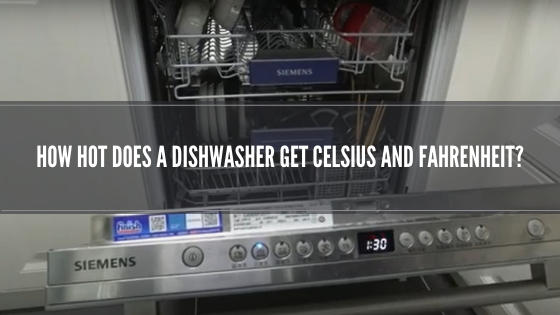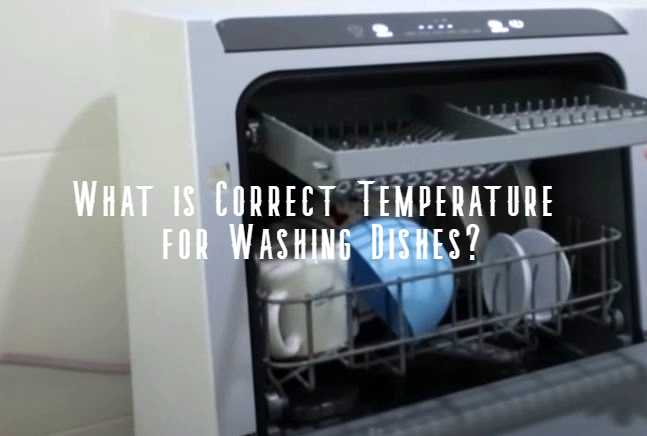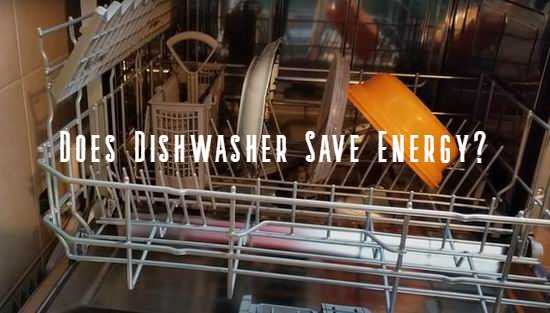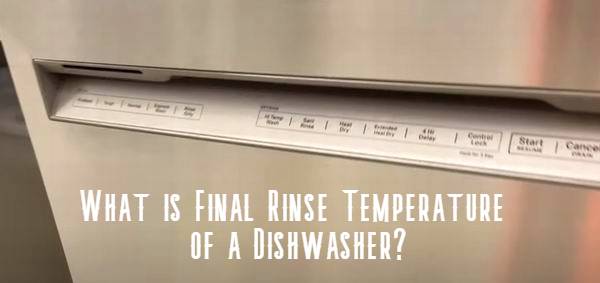
You might adore your epic machine. What’s special about it? A new one should have a stylish, sleek look. In time, you won’t pay attention to its beauty. Other kinds of things let you feast on your eyes. But it does the job. How hot does a dishwasher get? It saves your time, letting you hang out with your friends. Standing over a sink with dirty dishes is exhausting. Better activities exist, for sure. Efficient operation matters. Hot aqua makes dish surfaces clean, healthy, and safe. Your delicate hands won’t stand it. After all, temperatures make the difference. So, let’s delve into details.
Why Does Your Stellar Dishwasher Get Hot?
You might accustom yourself to conveniences. What do they mean to you? Modern amenities don’t make you happier. They undertake your work, letting you go out or chill at home. Do you pay a lot of time to your kids? A grip of days before Halloween is engaging.
In October, you can decorate your house and yard with pumpkins. Creating or adjusting Halloween costumes is hella exciting. Spending hours in your kitchen is cheesy nowadays. It’s not only laborious but counter-productive. Hygiene and food safety is primary.
Do you explore the benefits of dishwasher vs hand washing? Your epic appliance helps you to:
- safe time and water;
- keep your kitchen clean;
- organize your leisure time;
- hold bacteria and gnarly grease at bay.
Which cleans better? Scalding water makes dishwashing efficient. Attacking grime and oils, it rinses harmful residue away. You get clean surfaces that meet strict safety requirements. Meanwhile, your skin, breathing, and nervous systems are out of danger.
How Hot Should be Water in Your Dishwasher?
Have you ever washed greasy dishes by hand? By doing it every day, you should realize the impact of hot water. Is your skin sensitive to temperatures? Ideal for the bathing range is at about 92-98 degrees. Hands are the least vulnerable body parts. They withstand hot water of 100-105ºF.
Do your know how to wash your hands properly? Dirty dishes would wipe the science out. In your dishwasher, they undergo efficient treatment. Does your dishwasher do the job? A short temperature chart is illustrative.
| Cycle | Minimal Water Temperature, ºF | Maximum Water Temperature, ºF |
|---|---|---|
| Entering | 120 | 150 |
| Lights | 120 | 130 |
| Normal | 130 | 140 |
| Heavy/intense | 140 | 150 |
| Auto | 120 | 140 |
Entering your dishwasher, hot water is to reach its minimum recommended temperature. 120 degrees make the initial level that lets it run efficiently. Are you using the water to bathe? 120 degrees are the utmost to avoid scalding. Does your skin stand the temperature? It would be too hot, especially for kids. Lower it, as it can cause severe burns.

Water Heater Temperatures
Hot water is always essential. Every day, you use it for bathing, showering, cooking and cleaning. What about your heater settings? EPA recommends turning the thermostat down. 120-degree temperature is beneficial: it lets you reduce power consumption.
This way, you save energy and prevent scalding. If you are a healthy adult person, it’s hella safe. Kids and seniors are vulnerable to heat. So, you are to lower the temperature (up to 115º F or so) or shorten exposure time. Are burns the only risks? Dermatologists consider 110-112 degrees optimal bath water temperature. It doesn’t make your skin lose moisture.
What about your powerful machine? Hot water temperature for dishwasher should not be lower than 120 degrees. Otherwise, it would have trouble with:
- dissolving detergents;
- activating them;
- use jet dry rinse aid properly;
- remove baked-on grime from the soiled surfaces.
It’s necessary at the start of every washing cycle. Does anything go wrong? It doesn’t mean your powerful machine is janky. Just do a grip of simple checking operations.
Common Dishwasher Water Heating Issues
Your stellar household helper is to be hella efficient. It lets you get sparkling clean, dry dishes in a flash. How long is a normal dishwasher cycle? In different brands and appliances, it lasts from 1 hour to 2 hours and a half. Commonly, you think nothing of it, as you don’t deal with it. All operations and procedures are automatic.
When your dishwasher doesn’t do the job properly, it’s another thing. These signs may include white residue, water spots on the surface. Do your glasses and dishes remain greasy after dishwashing? It might happen due to insufficient water temperature. If it happens, try to check:
- filters and grates;
- jet dry dispenser;
- inlet valve;
- plumbing system and water supply lines.
Quite naturally, the quality of the products you use matters. The favorite non-toxic dishwasher detergent for hard water is easy to dissolve fast. Organic active components, like oxygen bleach, are powerful but not abrasive. They mix with aqua in pre-rinse and wash away after cleaning. Tabs and pods don’t make difference, and most importantly, they feature fast-dissolving biodegradable film. Aqua inlet temperature shouldn’t be questionable.
What Should the Temperature of the Detergent Water Be?
Hot water washing is preferable. In the USA, it commonly makes at least 120 degrees. Is it lower? Try to check it, using:
- dishwasher’s thermostat and heating element;
- temperature sensor;
- a digital thermometer;
- your water heater settings.
Are you sure, inlet water is to be hot enough? Try to run your kitchen faucet for a grip of minutes. It should drain cold water in the supply line. Plumbing that is pipes or tubes would not be easy to unclog. Filters, inlet holes, valves and dispenser lids are intuitive to check.
Cold water may let grease and fatty materials stuck to the surfaces. They might block the holes. Meanwhile, top-quality detergents work with cold water well. Their soap part dissolves easily. Even if the water temperature is about 50-80 degrees, it does the job. Enzymes need heat to activate them. But if modern detergents don’t contain harmful chemicals, no big deal.

How hot is Dishwasher Water for Washing Dishes?
Do you like washing dishes by hand? I guess routine or monotonous work is boring. Repetitive operations may disrupt your creativity. But, on the other hand, lets your mind chill, getting some rest. If you did it in your childhood or at a young age, it may reduce stress. According to a study, this activity has a positive, calming effect.
Why does it happen? In your kitchen, you feel comfortable, talking to your close ones and laughing. It gives some bonding time between you and your kids. For example, you can teach your tiny tot doing household chores. Telling the colors or kitchenware materials is easy.
Manual washing is beneficial for fragile items and delicate surfaces, such as:
- copper mugs;
- aluminum pots;
- crystal glasses;
- wooden boards and spoons;
- disposable plastic containers.
Dishwater water reaches temperatures of 155-170 degrees. It would damage most plastics, making thin containers warp or melt. Your common tableware withstands the exposure. It includes ceramic, stainless steel, silicone and glass. Hot water is essential to dislodge grease from smooth, hard surfaces and wash it away.
Water-Saving Concerns
Do you enjoy washing your casual cups and plates by hand? This routine work might take a grip of your precious time. Over time, it becomes hella tiresome. If your family is big, huge piles of dirty dishes would make you crazy. Regular clean-ups in your kitchen become laborious.
Without all of your helpful modern appliances, it might be a nightmare. Washing your casual dinnerware by hand is exhausting. I guess you easily find a much more practical and creative hobby. To add insult to injury, this activity is wasteful. Running water down the drain, you waste money.
How much hot water does a dishwasher use? Stellar modern machines are:
- efficient;
- energy-saving;
- eco-friendly;
- automatic and smart.
Detecting the soil level, they use as much water as necessary. In comparison with handwashing, it might be up to 7 times less. These epic appliances adjust the temperature. They choose the most efficient wash and dry settings.
Residential Water Usage Issues
Your household might consume a lot of water. If your family is big, it makes up to 300 gallons/day. Bathing and showering practices are the most wasteful. I hope you have eliminated leaks successfully. According to EPA, they make 12.0-13.7% of daily water usage.
It results in heavy waste of natural resources and your monetary assets. A similar situation is with manual washing of your glasses and plates. In San Francisco, one gallon of cold tap water costs 0.022 USD, on average. Every month, you pay up to $200 for water.
Electricity use may also become spendy. Do dishwashers heat their own water? The ones that do are energy-saving. These epic machines consume only 1 gallon/day or 1.4% per person on a regular basis. So, you can easily lower your utility bills. Additionally, your automatic machine is hella efficient. Do you still soak your kitchen utensils in greasy water in a sink? Even if you rinse the surface afterward, it’s not sanitary enough. Health and safety concerns matter.

Benefits of Hot Water Supply
Do you use cold tap water to run your dishwasher? In Europe, it’s a common practice. What is the inlet water temperature? In cold climates, it might feel almost icy. In winter, it may approach 40ºF, causing discomfort. Washing your hands in cold water, you get a gnarly sting feeling.
Fortunately, in San Francisco, water temperature is stable. All year round, it can’t be lower than 55-60 degrees. Is it enough for your epic dishwasher to operate? Most brands cope with the task. Therefore, your powerful machine starts and runs efficiently. Innovative detergent components mix with water well.
Meanwhile, recommended water temperature for the dishwasher makes 120-160 degrees. Sometimes, it reaches 170ºF. Why is it necessary? This option is essential, as cold water is less efficient to dissolve:
- detergent;
- oils and greasy film on the plate surfaces;
- soap residue;
- heavy-duty components and watermarks.
This way, you get the best performance from your mental dishwasher. It runs fast and easy, saving water and energy.
Do Dishwashers Get Hot Enough to Kill Germs?
Stubborn stains or baked-on grease on your cookware look gnarly. Scrubbing the surface with a brush or a sponge is exhausting. Really, it’s a hassle. Do you like the results? Even if your frying pan looks clean, it’s half the battle. Getting rid of food stains and residue is not enough.
Your epic machine does the job. Running on its optimum efficiency, it eliminates health risks. Dishwasher temperature impacts food safety directly. It is to be high enough to kill harmful pathogens, like:
- viruses;
- bacteria;
- fungus;
- protozoa.
Scientists from the University of Arizona suggest a mental solution. Thus, Kelly Reynolds presumes, the temperature of 140 degrees is preferable. It’s enough to kill most food-borne bacteria, like Salmonella. At room temperatures, they multiply by two. It happens every 20 minutes or faster.
Molds and yeasts are also heat-sensitive. Most importantly, scalding water does the job. But and long-time exposure is essential. How long do germs survive under such conditions? You are to heat them for 28-30 minutes, at least. Dishwashers’ manufacturers keep it in mind.
Do Dishwashers Get Hot Enough to Sterilize?
If you feel anxious about the risks of infection or contamination, it’s easy to prevent. An efficient detergent does the job. Additionally, you can use any chemical agent. Tablets, sterilization liquids or vinegar disinfect the surface. UV light also answers the call.
Boiling or steaming sanitizing method is beneficial. It’s safe and eco-friendly. If you suffer from allergies, you would prefer heat over chemicals. Which items do require sterilization? Of course, there is a grip of critical stuff in your kitchen. It includes:
- baby bottles;
- mason jars;
- glassware;
- serving utensils;
- cutlery and crockery.
Does your dishwasher do the job? The one that features a special wash cycle or settings is beneficial. Only new, advanced and smart models do. Say, most Bosch machines offer the opportunities. Their PureDry technology heats water to 162 degrees, enabling epic sanitation.
Thus if you need your bottles to be sterile, it’s not enough. Accessories like plastic toys or pacifiers also need deeper sterilization. A dishwasher still enables thorough cleaning and sanitation of the surfaces.

What is the Highest Temperature in a Dishwasher?
Your stellar appliance is beneficial. It eliminates all lingering bacteria, making your tableware clean and safe. Your cutlery, cups and plates are hygienically clean after each cycle. Do you think 130-140 degrees is enough to do the job? When hot water enters your dishwasher, it’s its ceiling limit.
Do you want to set it higher? It might be dangerous, as it can:
- burn your skin;
- damage vulnerable parts of your dishwasher;
- bake food particles on the surface;
- reduce efficiency and cleaning power of the detergent.
Does your dishwasher consist of stainless steel? Both its interior and exterior might be shiny and durable. A grip of its parts may include thermoplastic. Thus, filtration system might be sensitive to high heat exposure. Is it self-cleaning? Harsh water conditions may still clog or damage them.
Hot water hoses may go soft too. If water pressure and temperature are hella high, it affects their condition. The hoses are prone to kink, impeding flow of water. In future, it can lead to leaks and cracks.
How Hot is Too Hot for Dishwasher?
Your home water heater is to meet a grip of needs. Don’t set it too high. In sinks, tubs and showers, scalding water is dangerous. It should be pleasantly warm, being comfortable to bathe or wash hands. What about your dishwasher? When you start a cycle, it shouldn’t be boiling-hot.
It might make white, hard water residue issues worse. Greasy film on the dish surfaces might also harden a bit. So are occasional food particles and stains. Fortunately, a cool dishwasher hard food disposer septic is preferable. It does the job, even if you don’t pre-rinse your dishes.
Quite naturally, the cycle and load matter. Commonly, dishwasher water’s temperature shouldn’t be higher than 150 ºF. Otherwise, it might cause:
- discoloration of delicate items;
- cloudy stains on glasses;
- limescale buildup;
- water circulation issues.
Clogging of spraying arms and wash pump is not critical. Too soapy or hot water may induce it. Cleaning could be tricky, but it’s fixable. Your delicate glassware or china is to be home and dry.
What is the Final Rinse Temperature of a Dishwasher?
Dishwashing is to kill most bacteria and germs. It’s necessary if somebody in your household is sick. In this case, all tableware that contacts food requires disinfection. Otherwise, there is no risk of food poisoning or bacterium infection. Exposure to high temperatures for 15-20 minutes is enough. It makes smooth surfaces completely safe.
Is your old dishwasher efficient? Check the settings. Some appliances heat the water up 180 ºF. A heating element does the job. This compact, tube-shaped part is essential. It’s necessary to enable efficient:
- cleaning;
- drying;
- sanitation.
Have you ever looked into your dishwasher’s tub? The heating coils are at the bottom. Delicate and plastic items should be as far from them, as possible. Load them to the top rack that is safer and easier. What is the high-heat exposure duration? It depends on the dishwasher model, cycle and load type.
Old, residential dishwashers may meet the minimum requirements. They allow 30-seconds exposure. It’s enough to enable efficient sanitation.

How Hot Do Dishwashers Get Drying?
Commercial dishwashers make the difference. They let a grip of people dine at a restaurant safely. The guests use available tableware and utensils, avoiding health risks. Heavy-duty equipment is essential. Some of these epic machines do the job within 3-4 minutes. They use high pressure and temperatures to clean and sanitize dishes.
A residential appliance is a bit slow. It may repeat the final rinse or wash. Altogether, it can take up to 20 or even 60 minutes. Afterward, your dishwasher dries the dishes. Is a heated dry option safe and efficient? It involves raising the air temperature to 160-180 degrees.
In comparison with the air-dry method, it’s:
- faster;
- more efficient;
- hygienic;
- beneficial.
A heating element does the job, while a grip of vents and fans distribute the air evenly. So, it’s fast and easy. Meanwhile, heat dry is an energy-consuming option: therefore, it’s not the most eco-friendly solution. Air dry is cheaper but longer. In late fall, it may work even in San Francisco. When air humidity decreases to 60-65%, it’s a shade better.
Bottom Line
Does your dishwasher get hot? Outside, it’s only a bit warm. Stellar insulation around the appliance prevents noise and heat distribution. Moreover, sealing eliminated possible leaks. The temperature of water and air inside it differs. Above all, it depends on the brand, model and the cycle you select. These showings are within reasonable limits. Water is to be warm enough to dissolve the detergent and enable efficient cleaning. But it shouldn’t be boiling-hot. Otherwise, it would damage delicate items. Some dishwasher parts may be sensitive to extreme heat too. Meanwhile, modern, advanced appliances are mental. They are smart and feature-rich. Sanitizing your casual dishes prevents most potential health risks. So, let an epic dishwasher undertake your work. Make sure, it’s safe and efficient and have a good time.
